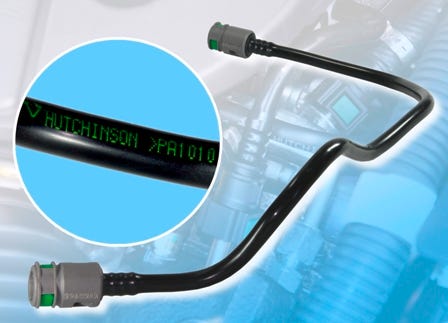Fluid transfer system supplier Hutchinson SRL (Rivoli, Italy) has specified a renewably sourced Zytel RS polyamide grade derived partly from castor oil from DuPont (Wilmington, DE) based on PA1010 for the production of fuel lines used with both diesel and biodiesel. The long-chain nylon was chosen in preference to competitive grades of PA12 on the basis of its superior temperature resistance and long-term aging performance in biodiesel.
October 19, 2011
Fluid transfer system supplier Hutchinson SRL (Rivoli, Italy) has specified a renewably sourced Zytel RS polyamide grade derived partly from castor oil from DuPont (Wilmington, DE) based on PA1010 for the production of fuel lines used with both diesel and biodiesel. The long-chain nylon was chosen in preference to competitive grades of PA12 on the basis of its superior temperature resistance and long-term aging performance in biodiesel.
|
Castor-oil based fuel tube handles biodiesel with ease. |
The extruded, monolayer fuel line from Hutchinson is already in use on commercial new turbo and multijet diesel engines used on several Fiat vehicles, including the Fiat 500, Panda, Punto, Lancia Delta, Alfa Romeo MiTo and Giulietta.
Components for systems employing biofuels must resist the chemically aggressive biofuels, temperature extremes and mechanical stresses for the lifetime of the vehicle. This specific Zytel RS grade, which contains more than 60% renewably sourced ingredient by weight, offers properties typical of flexible polyamides with additional benefits such as superior high-temperature resistance when compared to materials such as PA 12, high chemical resistance and low permeability to fuel and gases. It is suitable for a range of extrusion applications including fuel lines, hydraulic hoses, corrugated tubes, transmission oil cooler hoses and pneumatic tubes.
"We were seeking a polymer for our fuel line application that was preferably renewably sourced, for a more sustainable solution, and was able to provide the best aging stability in biodiesel," explains Katia Rossi, development manager at Hutchinson. "We considered a number of flexible polyamides, including PA12 as they had previously been specified for similar fuel line systems, but material testing showed Zytel RS PA1010 to meet our requirements. It combines, for example, superior temperature resistance to PA12 with the best resistance to biodiesel at high temperatures."
Data on aging performance in biodiesel was obtained by immersing the materials in the most common biodiesel - rapeseed methyl ester (RME) - at 125°C (257°F) for 1,000 hours and measuring retained mechanical properties. The B30 biodiesel used for testing is made up of 30% biofuel from rapeseed and recycled vegetable oil and 70% standard diesel and is suitable for many diesel cars.
By specifying the DuPont material for its fuel line for diesel engines, Hutchinson gains a longer-lasting solution that also is market leading in terms of its renewably sourced content. "With more than 60% by weight, this Zytel RS grade based on PA1010 has one of the highest levels of renewably sourced content currently available for a high-performance nylon," says Mario Delbosco, development programs manager at DuPont Performance Polymers. The renewable carbon in PA1010 comes from sebacic acid, which in turn is derived from castor oil.
The successful adoption of renewably sourced Zytel nylon for the fuel line has encouraged Hutchinson to extend the application to other automotive manufacturers in Europe and beyond as well as other fuel system applications.-[email protected]
About the Author(s)
You May Also Like



